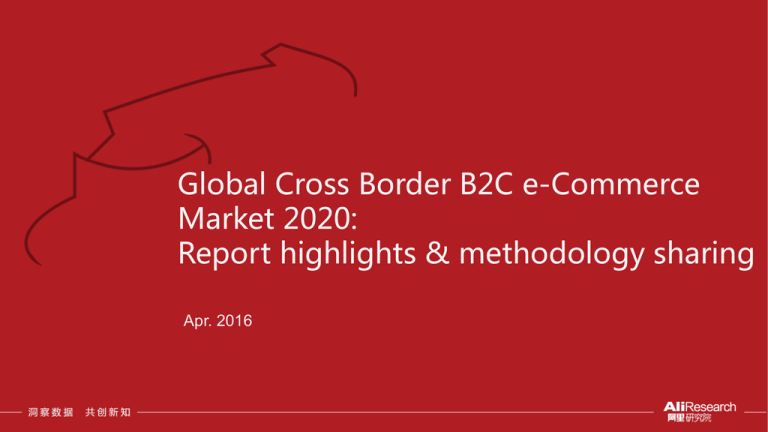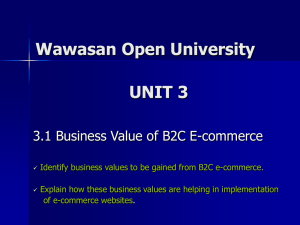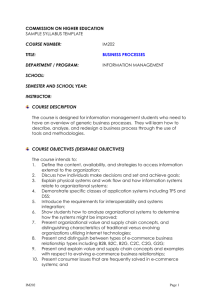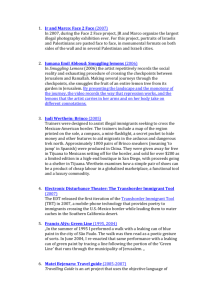
Global Cross Border B2C e-Commerce
Market 2020:
Report highlights & methodology sharing
Apr. 2016
Cross border B2C e-commerce market 2020: report highlights
Cross border B2C e-commerce market forecast by region (US$ bn)
MiddleEast & Africa
Mid-eastern Europe & Central Asia
Latin America
North America
Western Europe
Asia Pacific
994
26
53
826
22
40
47
675
18
34
37
530
14
28
25
236
5
6 13
308
8
10 17
98
217
156
131
381
299
218
99
201
4
201
5
Local industry structure
Development level of
consumer goods &
services sector
Development of retail
industry
Potentials for B2C ecommerce growth
Sizing of local
consumption market
‘Long tail’ customers to
be addressed
internationally
184
476
73
71
Demand – supply dynamism
115
92
Penetration of mobile
Internet
133
112
Tariff, Regional economic
integration & single
market
177
153
82
67
Ease of cross border
trade
45
+27.3%
401
10
22
15
Infrastructure readiness
144
201
6
Copyright © 2015 Accenture All rights reserved.
201
7
201
8
201
202
9
0
Sources:
AliResearch
– Accenture, Global Cross Border e-Commerce Market 2020, Jun. 2015
2
Cross border B2C ecommerce market definition: in context of global
consumer goods trade
Trading (cross border)
1
Traditional
offline
trader
2
Producer
3
Online
e-commerce
platform (cross
border, B2B)
4
•
•
•
•
Copyright © 2015 Accenture All rights reserved.
Distribution
Traditional
offline
distribution
Online
e-commerce
platform
(domestic)
End-user /
consumer
1
Traditional cross
border goods trade
2
e-commerce of
imported goods
(B2C)
3
Cross border B2B +
offline retail
4
Cross border B2C
e-commerce
Integrated e-commerce platform
Cross border ecommerce platforms (Alibaba,
Amazon)
Online stores of foreign branded producers
Foreign store webistes + agents
…
3
Market definition & coverage in the report
Criteria
selection
Definition of ‘cross border’
Major concerns of the
definition
By products: origin, brands,
etc.
Might not really cross
border ‘online’
Transaction parties in
different economies
Could via agents: to
cover Haitao type of
deals
Whether cross border
shipment of goods involved
Might not really ‘B2C’
Whether cross border
payment involved
Localization of payment
might lead to misjudge
Whether cross border
transmission of data / info
involved
Copyright © 2015 Accenture All rights reserved.
Too vague to define
Market definition in the report:
Cross Border B2C e-Commerce
Scope of delivery:
• Physical products
• Digital contents
• Services (OTA, etc.)
Type of sellers:
• Cross border platforms
• Foreign distributors (e.g. retailers)
• Foreign producers / service providers
Delivery methods:
• International parcels
• Delivery from bonded warehouses (to distinguish between country
border and customs border
Payment:
• Banking card
• 3rd party payment platforms
…
4
Our methodology for market sizing and forecast
Cross
border B2C
EC size
(historical)
B2C EC
market
size
(historical)
Leveraged
existing
market stats
Data
validation &
cross
check:
Consistency
of definition
among
different
data
sources,
etc.
Economies whose cross border B2C ecommerce market data are available:
• Data validation
• Calculation of Cross border B2C
penetration (Cross border B2C as % of total
B2C e-commerce market)
Economies whose cross border B2C ecommerce data are unavailable:
• Benchmark against economies with existing
data and calculation of cross border market
size based on existing penetration data
Cross
border B2C
EC market
forecast
Regression based forecast modelling:
• Correlational analysis to identify the major
indicators impacting the Cross Border B2C
penetration
• Regression analysis to develop the forecast
model based on prioritized indicators
• Leverage the existing forecast of indicators to
develop the penetration value forecast
• Forecast of cross border B2C market size based
on existing B2C market forecast and projected
cross border penetration ratio
Forecast validation & adjustment
Data & forecast validation & adjustment:
• Field validation : via expert interview, etc.
• Top down – Bottom up validation: data of economies vs. regional aggregates, etc.
• Relevant market cross check: B2C e-commerce vs. retail sales, cross border e-commerce vs. total cross border trade, etc.
Copyright © 2015 Accenture All rights reserved.
5
Cross border ecommerce market measurement: rough ideas from
private sector point of view
Following experiences in other industries, a global industry body of (cross border) e-commerce might play an constructive role:
•
•
Constituents of a private sector driven industry body:
–
Key industry players: major cross border ecommerce platforms
–
National / regional industry associations
–
Players in relevant services sectors: payment, logistic services, etc.
A Specialized Statistics Committee / work group to work on global market stats:
–
Standardization of market definition and statistical methodology
–
Request members to contribute market data
–
Consolidation and validation of contributed data
–
Coordinate with public sector for further validation: customs, etc.
Copyright © 2015 Accenture All rights reserved.
6
Another aspects of private sector data: rich and insightful data from
e-commerce platforms: case of Alibaba (1/2)
53
2000+
5400+
Countries / Regions
Categories
Brands
Copyright © 2015 Accenture All rights reserved.
7
Another aspects of private sector data: rich and insightful data from
e-commerce platforms: case of Alibaba (2/2)
United States
Japan
Germany
Korea
Australia
Netherlands
France
United Kingdom
Italy
New Zealand
Copyright © 2015 Accenture All rights reserved.
8
Thank You & Questions
taylor.li.guo@Accenture.com
yan.xuey@alibaba-inc.com






